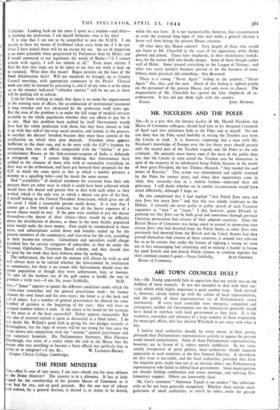MR. NICOLSON AND THE POLES Stu,-It is a pity that
the literary facility of Mr. Harold Nicolson, my House of Commons colleague, should lead him in his Marginal Comment of April 14th into unfairness both to the Poles and to myself. No one can deny that the Poles acted foolishly in seizing the Teschen area from the Czechs in 1938. It is, however, surprising that a man with Mr. Nicolson's knowledge of Europe over the last thirty years should present only the second part of the Teschen tragedy and the Poles as the sole criminals. He certainly must know, even if the mass of the public does not, that the Czechs in 1919 seized the Teschen area for themselves in spite of the majority of its inhabitants being Polish, because in the words of their great President, the late Thomas Masaryk, " they needed the coal mines of Karvina." This action was remembered and rightly resented by the Poles for twenty years, and when their opportunity came in 1939, .they naturally—but in a foolish fashion—redressed their old grievance. I still doubt whether we in similar circumstances would have acted differently, although I hope so.
He also complained that I had implied " that Polish Jews were not nice Jews but nasty Jews " and that this was wholly irrelevant to the Debate. I certainly am never guilty in public speech of such Victorian vagueness as " nice or " nasty." I did, however, quote Disraeli in pointing out that Jews can be both good and sometimes through previous Christian persecution bad citizens of their adopted countries. Since the British House of Commons was being asked to extend its protection over certain Jews who had deserted from the Polish Army, as other Jews who previously had deserted from the British and the Czech Armies had thus proved themselves bad citizens of these countries, it seemed very relevant for us.to be certain that under the banner of righting a wrong we were not in fact encouraging bad citizenship and so making it harder in future for good Jewish and non-Jewish Polish citizens to combine together for
their common country's good.—Yours faithfully, ALAN GRAHAM. House of Commons.


























 Previous page
Previous page